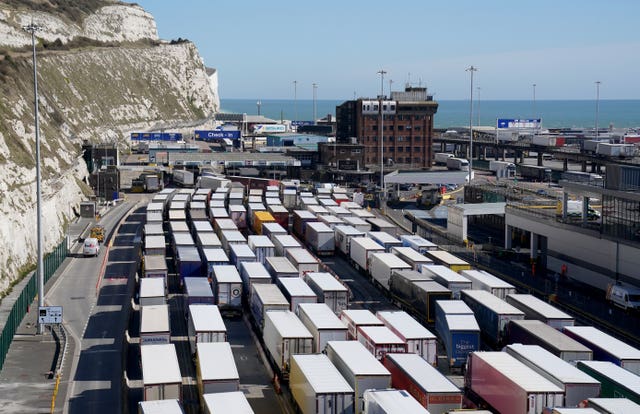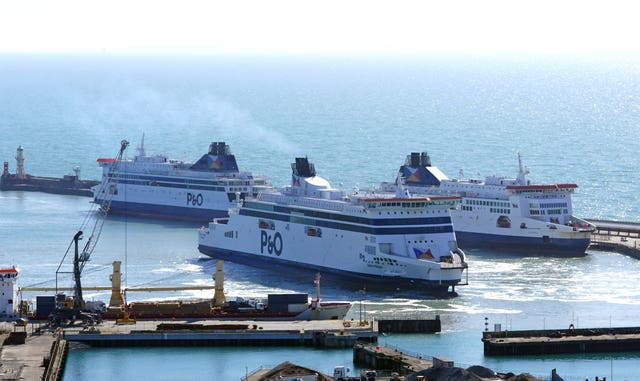
James O'Brien 10am - 1pm
17 March 2022, 19:34

The sackings sparked outrage from politicians and workers, many of whom refused to leave ships.
Unions were threatening legal action against P&O on Thursday after the ferry giant sacked 800 seafarers and replaced them with cheaper agency workers.
The move sparked outrage from politicians and workers, many of whom refused to leave ships, leading to the incredible scene of security guards with handcuffs being deployed to remove them.
The ferry operator, bought by Dubai-based logistics giant DP World in 2019, insisted the decision to cut jobs was “very difficult but necessary” as it was “not a viable business” in its current state.
Rail, Maritime and Transport union (RMT) general secretary Mick Lynch said: “We are seeking urgent legal action and are again calling for the Government to take action to stop what is fast turning into one of the most shameful acts in the history of British industrial relations.”
In the Commons, Transport Minister Robert Courts said the company’s actions were “wholly unacceptable” – a point he said he made “crystal clear” when he spoke to the P&O management.
“I am extremely concerned and frankly angry at the way workers have been treated by P&O,” he said.
P&O workers in Dover clashed with motorists after blocking a road close to the port in protest at being sacked.
Dozens of employees who lost their jobs stood on the road with banners and flags saying “Stop the P&O jobs carve up”.
A lorry driver trying to enter the port began shouting and beeping at those in the road, before being told “we’re not moving”.
One of the protesters, who had worked for the company for decades, told the PA news agency: “I refuse to move from this road, all this service for nothing.
“The police will have to take me away.”
Another man, aged 54, who has worked in ferry engine rooms since the 1980s, told the PA news agency: “I’m fuming, to be honest with you. I’ve known people who’ve been with the firm for years – this is no way to treat people.
“It was just a short message this morning saying you’ve all lost a job, basicall, all this service for nothing.
“I’ve seen coachloads of agency crews waiting in the car park at Hyde services just waiting to come down – it’s as simple as that.
“There’s going to be a protest here. One of the union guys just said if there’s no one working to come along and support.”

Labour MP Karl Turner posted a photograph on social media showing the captain of Pride of Hull addressing workers on the ship.
Mr Turner wrote: “They have support right across the city of Hull and the rest of the country, and are determined to stay on board for as long as it takes.”
Shadow transport secretary Louise Haigh said employers “cannot be given free rein to sack workers and replace them with agency staff”.
Conservative MP Huw Merriman, who chairs the Commons Transport Select Committee, urged the Government to do “everything it can to ensure that this appalling employment transaction cannot be completed”.
He added: “Concern remains as to whether this is lawful.”
Transport Secretary Grant Shapps said his officials “will be having urgent discussions with P&O about the situation, particularly of concern for their workers”.

Some of those who lost their jobs were informed of the decision on a video call from a P&O official who said: “The company has made the decision that its vessels going forward will be primarily crewed by a third-party crew provider.
“Therefore, I am sorry to inform you that this means your employment is terminated with immediate effect on the grounds of redundancy.”
P&O Ferries said in a statement: “We have made a £100 million loss year-on-year, which has been covered by our parent, DP World. This is not sustainable.
“Our survival is dependent on making swift and significant changes now. Without these changes there is no future for P&O Ferries.”
Regretfully, P&O Ferries services are unable to run for the next few hours. Our Port Teams will guide you and travel will be arranged via an alternative operator.
We apologise for the inconvenience this will have on your journey plans.
— P&O Ferries (@POferries) March 17, 2022
Sailings were halted on Thursday morning and would remain suspended “for the next few days”, P&O Ferries told passengers.
P&O Ferries, which transports passengers and freight, operates four routes: Dover to Calais; Hull to Rotterdam; Liverpool to Dublin; and Cairnryan, Scotland, to Larne, Northern Ireland.
DP World was criticised for paying a £270 million dividend to shareholders at the end of April 2020 while P&O Ferries cut around 1,100 jobs as demand for travel collapsed due to the coronavirus pandemic.
Manuel Cortes, Transport Salaried Staffs Association general secretary, said: “This is absolutely despicable behaviour from P&O, designed to reduce pay and worsen terms and conditions for their staff. They should be ashamed of themselves, treating loyal and hardworking staff like this.”
TUC general secretary Frances O’Grady said: “No one should be laid off with zero notice and no consultation, let alone a whole workforce. P&O’s secret plan to sack their workers is reprehensible and unlawful.
“When an employer lays off more than 100 staff at once they must consult workers and unions in advance and they are required to notify the Secretary of State in writing in advance too. The Government must urgently explain what they knew and when.
“If P&O breached the law they must suffer severe consequences, with ministers increasing the legal penalties if necessary. If one employer gets away with this, every worker is at risk.”
Tom Long, partner at law firm Shakespeare Martineau, said: “P&O’s decision to fire 800 staff with immediate effect appears to contravene the requirements needed for a normal mass redundancy.
“Where an employer plans to make 20 or more redundancies, there is a requirement for a period of consultation with employee representatives, such as a trade union. That period is 45 days, where 100 or more redundancies are planned in any one location.
“As such, P&O would be expected to undergo this process before making any mass dismissals. It’s not evident whether this has happened, although it would appear not.
“If employees are made redundant they can bring a claim of unfair dismissal in the employment tribunal, with the maximum compensation being up to a year’s salary in most cases.”